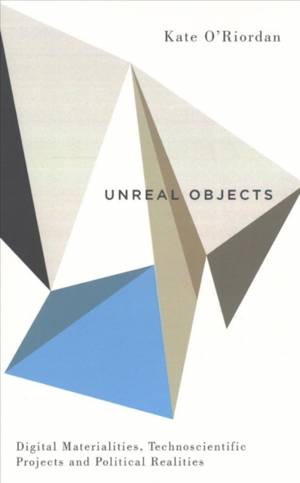
- Afhalen na 1 uur in een winkel met voorraad
- Gratis thuislevering in België vanaf € 30
- Ruim aanbod met 7 miljoen producten
- Afhalen na 1 uur in een winkel met voorraad
- Gratis thuislevering in België vanaf € 30
- Ruim aanbod met 7 miljoen producten
Zoeken
Unreal Objects
Digital Materialities, Technoscientific Projects and Political Realities
Kate O'Riordan
€ 29,45
+ 58 punten
Omschrijving
More than ever before, scientific and technological innovations are playing increasingly important roles in our lives. New products developing today will fundamentally shape the world around us and manipulate our lived experience in the future. In twenty years, we could be zooming on hoverboards to visit real-life Jurassic Parks or navigating with our optic-implanted GPS systems. In this age of blossoming innovation, however, many wonder: how and why are these important projects chosen? And what are the ultimate consequences of this process? In Unreal Objects, Kate O'Riordan unpacks these crucial questions and fills a gap in the theorization of digital materialities. Through her investigation, she discovers that many objects--such as genomic projects, artificial meat, and re-creation of extinct species--cannot be granted scientific legitimacy and developed without extraordinary amounts of media, celebrity endorsements, and private investment. As a result of these filters, only certain projects take center stage when it comes to funding and political attention. O'Riordan calls these unreal objects; scientific projects and technologies whose utopian visions for the future are combined with investment and materialization in the here and now. By separating the media hype from the reality, O'Riordan shows how the huge amount of attention paid to these unreal objects hides more pressing social injustices and inequalities, while at the same time conjuring utopian visions for how life might be lived.
Specificaties
Betrokkenen
- Auteur(s):
- Uitgeverij:
Inhoud
- Aantal bladzijden:
- 174
- Taal:
- Engels
- Reeks:
Eigenschappen
- Productcode (EAN):
- 9780745336749
- Verschijningsdatum:
- 15/08/2017
- Uitvoering:
- Paperback
- Formaat:
- Trade paperback (VS)
- Afmetingen:
- 135 mm x 208 mm
- Gewicht:
- 249 g

Alleen bij Standaard Boekhandel
+ 58 punten op je klantenkaart van Standaard Boekhandel
Beoordelingen
We publiceren alleen reviews die voldoen aan de voorwaarden voor reviews. Bekijk onze voorwaarden voor reviews.











